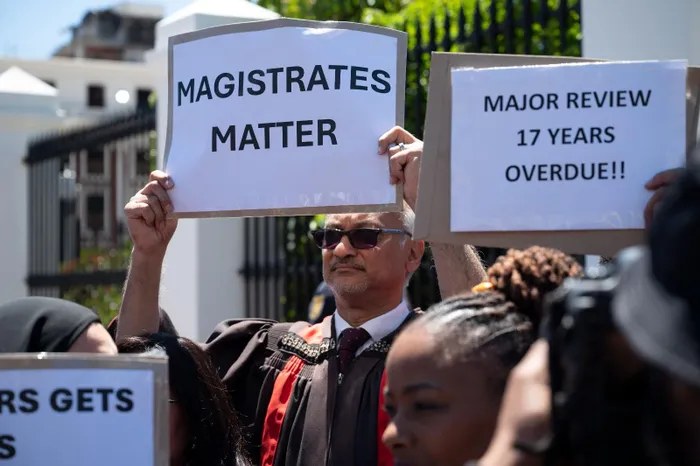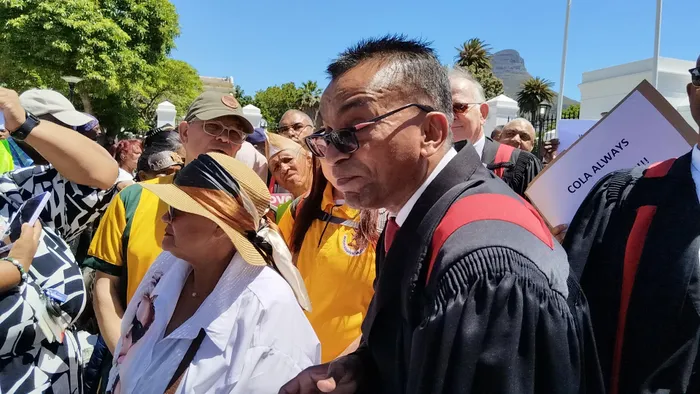Judicial officers demand recognition and better conditions in Cape Town protest

Western Cape magistrates marched to Parliament in Cape Town on Wednesday, where they presented a memorandum to presidency representative Charles Ford demanding judicial reforms, improved salaries, and recognition as 'judges of the lower court'.
Image: Armand Hough/Independent Newspapers
In a landmark protest, Western Cape magistrates marched through the streets of Cape Town on Wednesday, making their way to Parliament to confront the growing tensions within South Africa's judicial system.
Spearheaded by the Judicial Officer's Association of South Africa (Joasa), the magistrates delivered a strongly worded memorandum to the Presidency, demanding recognition as part of a 'single judiciary', significant salary reforms, and better working conditions.
The magistrates marched to parliament to hold a Section 17 demonstration to highlight the plight of the lower court judiciary - the memorandum was received by Charles Ford, an official and representative of the Presidency.
Joasa Western Cape secretary, Rohan Roopnarian, said the South African Constitution enshrines the principles of a single, independent and impartial judiciary.
“However, judges of the lower court (magistrates), who form a crucial part of the judicial system, face significant challenges that undermine their independence, financial security and overall well-being,” said Roopnarian.
The delegation united in their call for a number of concerns which included the exclusion of magistrates from the judiciary and proposed a name change from magistrates to “judges of the lower court” to reflect their role more accurately.

The Section 17 demonstration highlighted the growing dissatisfaction within South Africa's magistracy about their status and working conditions. Judicial Officer's Association of South Africa (Joasa) secretary, Rohan Roopnarian read out the memorandum.
Image: Chevon Booysen
With regard to financial insecurity, Roopnarian said delays in making recommendations and implementing salary adjustments have eroded judges of the lower courts' financial security.
They also called for a salary for life and or a separate pension fund for magistrates.
“The lack of benefits in line with those of other office bearers include for example official vehicles, petrol cards, tax rebates, spouses benefits, travel, housing, entertainment and medical aid, said Roopnarian.
Added to their concerns, the magistrates highlighted that their independence was compromised as they are forced to remain within the Government Employees Pension Fund (GEPF) which “directly conflicts with their independence and creates a perception of bias”.
The magistrates called for a platform to be established where regular dialogue between magistrates, the chief justice, the Magistrates Commission and the Ministry of Justice to address concerns and improve working conditions.
Accepting the memorandum, Ford said: “My role is to make sure that we do get it into our processing and make sure it gets to the president’s desk. That’s the normal process.
“It will take between four to six weeks to get a reply. That is the administrative process that we do. In terms of responding to (the memorandum), I won’t do that now,” said Ford.
According to the Democratic Governance and Rights Unit’s (DGRU) 2022 survey of South African Magistrates’ Perceptions of their Work Environment, key findings indicated that the magistracy was under increasing pressure, both from within and outside it.
Magistrates' Matter, noted: “Reported working hours remain very high for some magistrates but not for others, with time in court taking up the bulk of their time. Most magistrates continue to report being under a great deal of stress, with the vast majority reporting multiple symptoms of stress.
Get your news on the go, click here to join the Cape Argus News WhatsApp channel.
Related Topics: